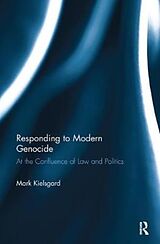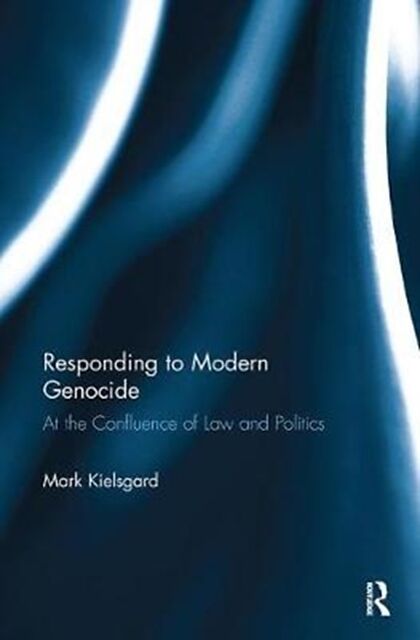Responding to Modern Genocide
Einband:
Kartonierter Einband
EAN:
9780815355328
Untertitel:
At the Confluence of Law and Politics
Genre:
Internationales Recht
Autor:
Mark D Kielsgard
Herausgeber:
Taylor & Francis
Anzahl Seiten:
270
Erscheinungsdatum:
21.12.2017
ISBN:
978-0-8153-5532-8
Zusatztext "Kielsgard (City Univ. of Hong Kong) offers a compelling discussion of the role politics plays in the possibility of preventing genocide...The beginning traces the evolution of the law on genocide and the politics of its development. The second section of the book essentially discusses several theories of genocide highlighting the elements that lead to genocide. When these elements are identified! Kielsgard argues! prevention could be possible if the political will exists. The next section looks at how genocide denial affects the ability to prevent genocide because denial permits future crimes against marginalized groups. The final part of the book discusses transitional justice responses following genocide."W. R. Pruitt! Virginia Wesleyan College! CHOICE Informationen zum Autor Mark D. Kielsgard is Assistant Professor at City University of Hong Kong. Zusammenfassung Developments in the understanding and treatment of genocide through the twentieth century have involved a combination of politics, public opinion, social trends, and economic development, and led to the substantive law of genocide and the assumption of international jurisdiction. This book analyzes incidences of genocide and mass atrocities, focusing on the political factors involved in modern counter-genocide efforts. Drawing on incidences of genocide and mass atrocity such as the Holocaust, the Rwandan genocide, and the Armenian genocide, Mark Kielsgard adopts a conceptual model that reveals the political factors which impact the international law of genocide, such as barriers and catalysts to transitional justice and the politics of genocide denial. As a work which provides a focused picture of those influences and their significance to genocide studies, this book will be of great use and interest to students and researchers in international criminal law, conflict studies, and conflict resolution. Inhaltsverzeichnis 1. Introduction: Responding to Genocide 2. The Function of Prevention 3. The Cost of Denial 4. Restorative Justice: The Essential Healing Process 5. Punishing Genocide 6. "No Peace Without Justice" 7. Conclusion: Tracking Trends and Projecting an International Order of Human Dignity ...
Autorentext
Mark D. Kielsgard is Assistant Professor at City University of Hong Kong.
Klappentext
This book analyzes incidences of genocide and mass atrocities, focusing on the political factors involved in modern counter-genocide efforts. Drawing on incidences of genocide and mass atrocity such as the Holocaust, the Rwandan genocide, and the Armenian genocide, Mark Kielsgard adopts a conceptual model that reveals the political factors which impact the international law of genocide, such as barriers and catalysts to transitional justice and the politics of genocide denial. Drawing on these examples, this work identifies issues and initiatives to provide an overview of the forces that shape genocide remediation and prevention.
Zusammenfassung
Developments in the understanding and treatment of genocide through the twentieth century have involved a combination of politics, public opinion, social trends, and economic development, and led to the substantive law of genocide and the assumption of international jurisdiction. This book analyzes incidences of genocide and mass atrocities, focusing on the political factors involved in modern counter-genocide efforts. Drawing on incidences of genocide and mass atrocity such as the Holocaust, the Rwandan genocide, and the Armenian genocide, Mark Kielsgard adopts a conceptual model that reveals the political factors which impact the international law of genocide, such as barriers and catalysts to transitional justice and the politics of genocide denial. As a work which provides a focused picture of those influences and their significance to genocide studies, this book will be of great use and interest to students and researchers in international criminal law, conflict studies, and conflict resolution.
Inhalt
1. Introduction: Responding to Genocide 2. The Function of Prevention 3. The Cost of Denial 4. Restorative Justice: The Essential Healing Process 5. Punishing Genocide 6. "No Peace Without Justice" 7. Conclusion: Tracking Trends and Projecting an International Order of Human Dignity

Leider konnten wir für diesen Artikel keine Preise ermitteln ...
billigbuch.ch sucht jetzt für Sie die besten Angebote ...
Die aktuellen Verkaufspreise von 6 Onlineshops werden in Realtime abgefragt.
Sie können das gewünschte Produkt anschliessend direkt beim Anbieter Ihrer Wahl bestellen.
Loading...
Die aktuellen Verkaufspreise von 6 Onlineshops werden in Realtime abgefragt.
Sie können das gewünschte Produkt anschliessend direkt beim Anbieter Ihrer Wahl bestellen.
| # | Onlineshop | Preis CHF | Versand CHF | Total CHF | ||
|---|---|---|---|---|---|---|
| 1 | Seller | 0.00 | 0.00 | 0.00 |
